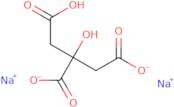di-SODIUM HYDROGEN CITRATE Extra Pure
CAS: 144-33-2
Ref. 3D-AAA14433
| 25g | Discontinued | ||
| 50g | Discontinued | ||
| 100g | Discontinued | ||
| 250g | Discontinued | ||
| 500g | Discontinued |
Product Information
- 1,2,3-Propanetricarboxylate, 2-Hydroxy-, Sodium Salt (1:2)
- 1,2,3-Propanetricarboxylic acid, 2-hydroxy-, disodium salt
- 1,2,3-Propanetricarboxylic acid, 2-hydroxy-, sodium salt (1:2)
- Alkacitron
- Citralka
- Citric acid, disodium salt
- Disodium 3-Carboxy-3-Hydroxypentanedioate
- Disodium Citrate
- Disodium Citrate 1.5 H2O (Sodium Acid Citrate)
- Disodium Monohydrogen Citrate
- See more synonyms
- Disodium hydrogen citrate
- Monobasic sodium citrate
- Sodium Citrate Dibasic
- Sodium citrate (Na<sub>2</sub>O<sub>7</sub>C<sub>6</sub>H<sub>6</sub>)
- di-Sodium hydrogen citrate
- Citric acid,disodium salt sesquihydrate
- Sodium citrate (Na2O7C6H6)
Sodium citrate is a salt of citric acid and sodium. It is used as an analytical reference standard in the analysis of citrates, especially for determining the amount of citric acid in a solution. Sodium citrate is also used to maintain pH stability in biological buffers. Citric acid is produced by the metabolism of glucose and has been shown to have a beneficial effect on tumor cells. Citric acid can be converted into malonic acid, which has been shown to inhibit bacterial growth. This chemical reaction can be monitored using LC-MS/MS methods. The stability of this compound can be determined using chemical methods or by measuring its biological properties such as its antibacterial efficacy. Citrate is also a good nutrient for tumor cells and has been shown to have anti-inflammatory effects on tumors because it inhibits prostaglandin synthesis.





